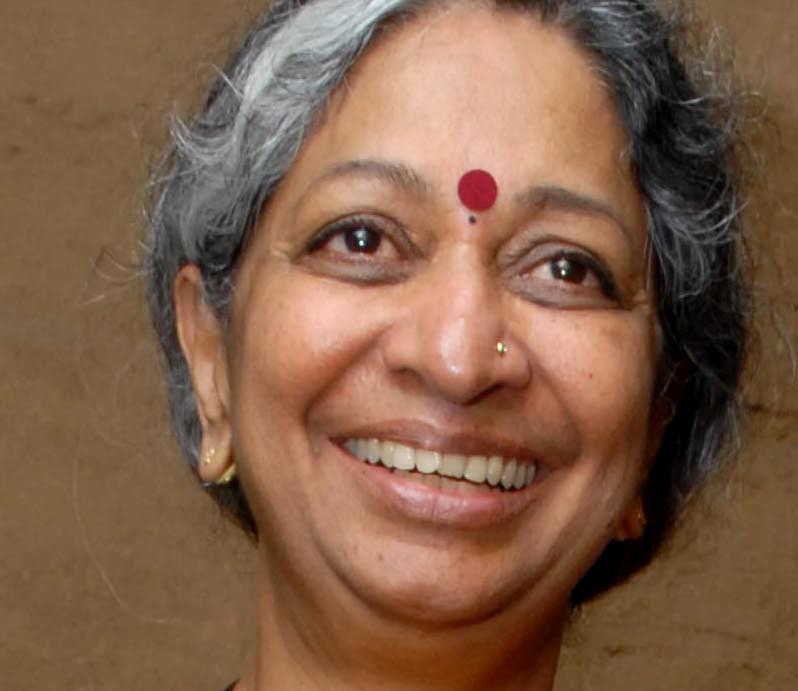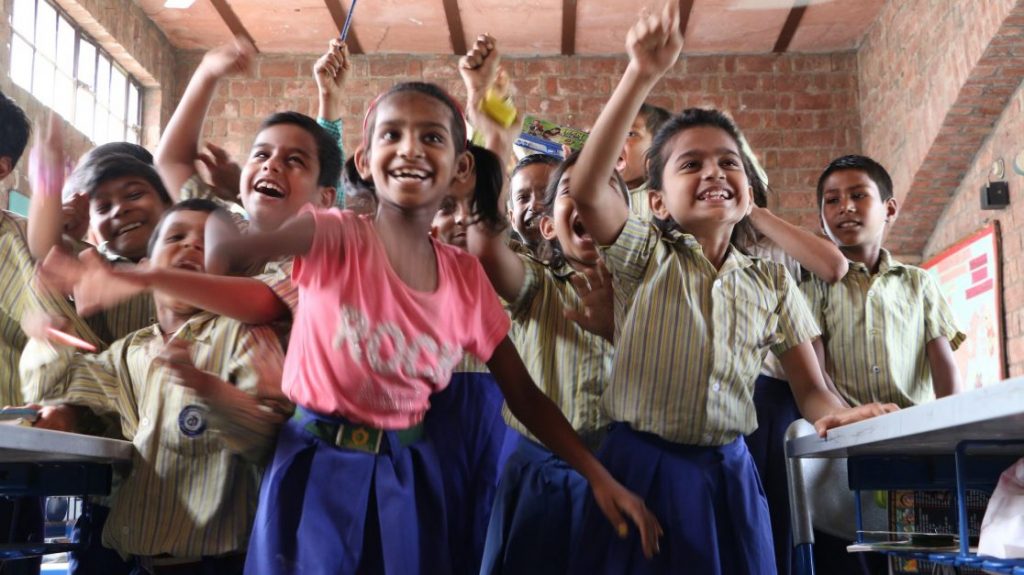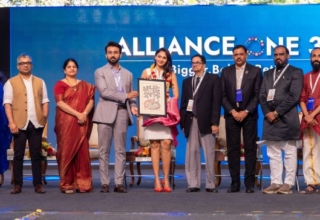

Geeta Dharmarajan, the founder president, publisher and editor-in-chief of Katha, a nonprofit social enterprise, is also a former honorary chairperson of National Bal Bhavan. Easily one of the finest authors of children’s books in contemporary India, she is the person behind the Katha Prize Stories, again a watershed in publishing history of the country where some of the best regional stories got translated and crossed the language barriers. No doubt, a Padma Shri in 2012 came as a well deserved recognition of her great contributions which are still continuing.
More than an author, editor or an ace translator, Geeta Dharmarajan’s journey with Katha that she founded in 1988, is a case study and offers potential insights into how the plethora of challenges thrown up by Covid-19 can be tackled vis-à-vis learning and schooling. For those, who are not familiar with Katha, it is the earliest known pedagogical interventional experiment of using story as a pedagogical tool, a pioneer in entrepreneurship education and in mainstreaming teacher mentoring. Autar Nehru, in this backdrop spoke with Geeta Dharmarajan to explore what of Katha’s success and wealth of experience could possibly be applied in the current extraordinary Covid-19 pandemic.

Katha’s exemplar work has been more as the story of educational transformation of the first generation learners and in fact most of the fieldwork by Katha happens in slum communities and schools catering to them. This pandemic and lockdown has impacted children of these communities along with migrants more than others. After prodding them to get into school, there is now a similar challenge of bridging the digital divide that threatens to leave them behind. So in a way life has come to a full circle for them. Give us a few insights from Katha’s own journey that makes this proposition look less grave?
Children in poverty cannot be made to wait for solutions and those who can provide these must come forward and this is a national service.
We at Katha have realized this long before and moved with technology change and seen this can be done. Let me briefly explain. When I started Katha I was already an author of children’s books, translating stories for adults, editing a children’s magazine for first generation learners. I fundamentally enjoy being a writer. So when we went to the two slums (in Govindpuri, Delhi), we thought we have books, children will read them and all will be happy. Our story books will engage them. But soon I realized these children cannot read. Many of them were not going to school. So we started the Katha School in 1990 to bring them to school.
But in spite of our efforts I couldn’t get more than 5 children. The mothers were unwilling tosend their children to school, as they needed them to earn a little for the family. So, we had to think of putting some money into their hands. With this came our income generation program and then the Katha School of Entrepreneurship (KSE) with the objective of helping women and children develop an entrepreneurial mind. When we were setting up KSE, we received a computer in donation and we had thought of using this for the publishing unit but before that we put it in the school and for children to see and feel it. They were so excited and engrossed with it that we later got 30 more computers and expanded the IT education.
In 2001, we started the Katha Infotech and Ecom School (KITES). A number of IT interventions have followed, bringing excitement and deeper learning to children:
- The K-SMSes (SMS learning for children through parents) and mobile phone based multiple choice questions, when it was unheard of,
- IT based MACH (Modern Applications for Children (MACh) Centres in each of the classroom right from preschool.
- The Robotics Lab
With time and need, we brought all our resources for teachers and mentors under one platform, under the PadhopyarSe website. under one roof. Now we have expanded this and migrated to a bigger site (childrensunivesity.in). We have put select 15 book titles on Kindle purposely during this lockdown so that reading and learning continues. Some of our books are on Google Bolo. Let me tell you, we have prepared and innovated each stage for all these 30 years and we are ready for this moment (of going digital). I began the work of Katha with a computer, and you can now say it is in the genes of our organization.
Katha also brought out an ebook on CoronaVirus?
Yes, “The Mystery of The Missing Soap” a simple story on how to tackle Coronavirus by hand hygiene like washing hands with soap. It was done in five languages and sent to all our children and over 2000 schools. Volunteers have come forward to make make an audio, dramatised rendering, film etc, and all this is being circulated and has gone viral across the globe. Hear this Hindi narration by a volunteer. https://www.youtube.com/watch?v=XlY4URusG_k
Digital is the way to go, at least at the moment as it has been accelerated by the current pandemic, can we call this paradigm shift or just a temporary arrangment? How can the impact of disruption on learning by this pandemic be reduced?
Children learn from one another. This is fun, proven and practical. Three years ago we had floated the concept of pairing of children as most reports and students were telling us that 50% of the 300 million school children can’t read. If they read together, they can learn from one another. This was the 300M Challenge and the ECTC way of getting all children to read well, for fun and meaning. So the same concept can be tried when we are in strict isolation. The least we can do is if someone does something interesting and creative, we can spread that through the mobile. If this corona has taught us a thing, it is to be compassionate and empathatic. So, we have to act as a community and do this for the country. If we can make this acceptable that we share phones with children and make parents and mentors talk to children, it will be the same pairing thing, I just mentioned. Speaking can be a great learning. We are in a situation where most parents don’t know about homeschooling. We need to think schooling and learning in a different way and help our children by making them empathetic. To learn to care and share, and be the agents of change for a more sustainable way of living and combating climate change.
Mobile and online Gaming and a near addiction to playing these games is a big talk point especially for community of parents and even teachers. This lockdown has only aggravated situation with a lot of time at disposal of children. How do you take this?
Why can’t you use something which is so popular with children to make them learn, expose to big ideas, make them think critically. What do I have to tell them aisa mat karo mat karo (don’t do this). It can be a win win situation both for the parent as well as child. We don’t teach our children for meaning, so much in this world, gamification opens doors to a whole new experience in exploration.
For me gaming is also about learning big ideas, opening doors of this unexplored world to our children. There is so much learning potential of gaming. At the same time, I agree killing, kicking and stabbing are more attractive to children than compassion, fun and inquisitiveness. But here comes our role as parent and teacher. There are a whole bundle of websites –gaming and otherwise — to watch and play, which are not violent and which we need to introduce to children.
I can cite an example. In this lockdown a10-year old boy Ahswin from Muscat (Oman)is reading our books and converting them into audio books on his own. And he feels ontop of the world after reading our stories. Now he didn’t do it on his own. His mother initiated him into this. He has created a beautiful video around our Corona ebook and uploaded it on YouTube. His younger brother Arjun is two years junior to him and yet he too is seen doing his act in the video. When it is uploaded, it will have his name and that of his school.And they have shred this with children across the globe and got their feedback. See this video https://www.youtube.com/watch?v=wLXut59dGic
There is a lot of positive gamification. There is a way out, we need to be positive. Our children are smarter than we were ever. They understand things, they could do things we didn’t and they do it so well. There was no mobile phone 20 years ago and down the line after 20 years there will be something, God knows what. So what will they need is curiosity, creativity and critical thinking for this kind of future. Let’s grow these three in our children as these are absolutely necessary to fulfill their potential and I must add parents and teachers don’t allow them to be critical thinkers. We shouldn’t give up on our children, but channelize them suitably.
Katha is also distinctly known for storytelling pedagogy. Tell us more about it.
We are bringing StoryPedagogy® into the curriculum and then into the classroom by which teachers access knowledge and broadcast that knowledge in an interesting way using drama. StoryPedagogy has been ideated and developed by me to make learning child-centred and exciting for the child. It incorporates key ideas from the 2000 year old treatise on drama, the Natya Shastra. It uses stories as the basis for all learning. Stories make a rich curriculum and through these stories they learn to listen, ask questions, become critical thinkers working out answers for their own issues. Normally educators talk of LSRW (Listen, Speak, Read &Write.) But in Katha we believe that Storytelling is an important skill which builds imagination and communication in children, and helps build their self esteem and confidence. So in Katha we add one more S (Storytelling) and talk of LSSRW being the basic language skills. The purpose of education is ultimately to build a good human being, a concerned active citizen in society.
As I said, we started the Katha Lab School, in 1990, but as this developed Government realised this was an excellent model for their schools catering to mostly first generation learners whose parents were not that literate. On the invitation of the Government and the Municipal Corporation, from 2008, we partnered with Government and started the I Love Reading (ILR) Programme in their schools. Working with students, teachers, principals and the Education Dept to get children reading well and for fun and meaning. This really improved Attendance Retention and Performance parameters significantly in measurable terms.
Then we were asked to partner with a few schools, which were performing badly, to run them with The Katha system of Education and StoryPedagogy.We brought in a good library and digital resources, smartboards, computer lab, and robotics labschools or running schools with low attendance.And that really attracted more children into school and performance improved significantly.
As we moved to working with more schools, we realized that our teachers were not remembering certain things. As is in general practice the syllabus was the curriculum and that in turn was the content of the textbook. So, we knew these teachers need to have continuous discussion with mentors on how to connect with story resources and connect to the NCERT curriculum. As we were not a moneyed organization we had to think of a frugal way of helping them. We set up a help line where these teachers would call up mentors and seek support. Then we put all resources we hadlike teacher lesson plans, graphic organizers,story resources, checklists and other informationinto a website which they could access freely. We also trained a number of their teachers on how to effectively use the website.
Give us a brief snapshot of Katha?
We work in Delhi NCR region with over 1000 communities and 1000+ schools. We are partnering with government in states like Haryana and UP. We have been able to turn around low enrolment and attendance schools. We have are palnning for similar intervention in Maharashtra and Tamil Nadu. Through the library network, we have reached out with our books to 10 million children all these years. Our publishing continues to be a major activity and already we have published over 400 titles so far.
Lastly, how did you end up doing what you are doing in Katha?
I think my childhood experience drove me to this field. I have seen my father, a doctor, as a giver. He would charge 50 paise for an injection but put a one rupee back in pocket of his patient to take care of child. Then as a student in a missionary school, I developed respect for all and also compassion. And, during my husband’s rural postings, I started to work for children and raised funds for flood victims. But the real trigger came after I returned home from the US after a two year stint, working with The Pennsylvania Gazette, an ivy league magazine started by Benjamin Franklin. I did some freelancing with Indian Express running a weekly column for children. I headed the Education programme for INTACH Chennai chapter, edited a teacher’s magazine for INTACH. I had also an exposure of the work Krishnamurthy Foundation school did. And then one fine day, after my husband was transferred to Delhi, I came to face this reality that so many children do not go to school, cannot read. And so started Katha in 1988, with the mission of enhancing the joy of reading and culture link through translation. And since then, this has been a 24 X 7 volunteer work for me.










